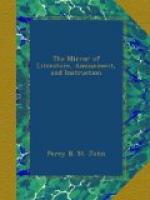“Upon a general review of our present prevailing amusements, it will be found, that if many have been dropped, at least in the metropolis, which it might have been desirable to retain, several also have been abandoned, of which we cannot by any means regret the loss; while those that remain to us, participating in the advancement of civilization, have in some instances become much more intellectual in their character, and in others have assumed more elegant, humane, and unobjectionable forms. Bull and bear-baiting, cock-throwing and fighting, and such like barbarous pastimes, have long been on the wane, and will, it is to be hoped, soon become totally extinct. That females of rank and education should now frequent such savage scenes, seems so little within the scope of possibility that we can hardly credit their ever having done so, even in times that were comparatively barbarous.”
Truly, as Charles Mathews says, “we are losing all our amusements.” Then follow about thirty pages of Holiday Notices; a sort of running commentary on the Calendar. The spaces of the days, however, are sadly disproportioned. Shrove Tuesday occupies upwards of two pages; Good Friday and Easter are pruned into the same space; May Day has upwards of four pages, more than half of which are taken up with the author’s own embellishment: still, not a word has he on the poetry of the Day beyond his motto from Herrick. Field Sports, as Hawking and Archery, occupy the next thirty pages; but Mr. Smith is wofully deficient in the latter department: for instance, how is it that he has not even mentioned the archery at Harrow School,[4] and the existence of archery clubs in the present day.—Bull-fights and Baiting of Animals occupy the next forty pages in two chapters, one of which has been mostly transcribed from the Encyclopaedia Britannica. An original account of a Spanish Bull Fight occupies twenty pages, and is interesting, but rather out of place among English sports. Dancing has thirty pages, for which the Encyclopaedia Britannica has also been very freely taxed. Morris Dancers have ten pages. Jugglers have about the same space, chiefly from Strutt and Brand: Beckmann’s chapter might have been added. Music and Minstrels have thirty pages, from Hawkins and Burney. Mr. Singer’s curious work has furnished about twenty pages on Playing Cards. Chess is compressed within ten pages! The English Drama, thirty pages, is acknowledged from Hawkins’s History of the English Drama, Cibber, and Victor; but “more especially from the Biographia Dramatica,” we should say, the weakest source of the four. Malone’s Supplement to his Edition of Shakspeare has entirely supplied thirteen pages of Playhouse Notices;—and here the curtain falls—sans Index, or the Author’s Farewell.




